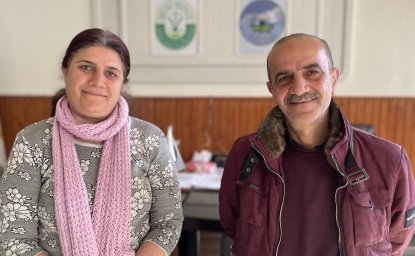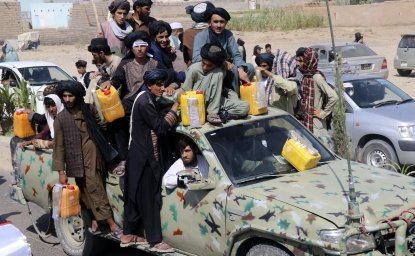
A blog of the Middle East Women's Initiative
Today, young people in the Middle East and North Africa (MENA) region are taking bold steps to spark dialogue and reform on the issues that determine individuals’ and society’s well-being. Entrepreneurship is a powerful means of engagement and activism for youth. Political systems and policymaking channels widely marginalize, or entirely exclude, the role of young people. Instead, entrepreneurship puts youth in control of their future and success.
Digitization is proving to be an effective means of economic diversification. The region now hosts 3,000 startups, attracting $1 billion in investments in 2020 alone.
The region suffers from bloated public sectors and private sectors heavily dependent on the services and state investment. The current generation of entrepreneurs can disrupt the status quo and bring in fresh ideas to stimulate the economy. For example, tech-savvy young people are accelerating the digital economy through revolutionary start-ups and incubators. Digitization is proving to be an effective means of economic diversification. The region now hosts 3,000 startups, attracting $1 billion in investments in 2020 alone.
Entrepreneurship may give hope to failing economies. Lebanon is spiraling toward economic and fiscal collapse, yet some entrepreneurs are staying strong. The American University of Beirut partnered with the Beirut Digital District to bridge the gap between the entrepreneurial and academic worlds. Lebanon-based startups such as Berytech, SmartESA, and AltCity support entrepreneurs and their new businesses. Initiatives such as DOT Lebanon, a youth-led movement to crowdsource digital entrepreneurship skills, shows the country’s young people have not given up. Meanwhile a talent cluster is growing in the heart of Baghdad around accelerators and coworking spaces like The Station. The Station meets entrepreneurs’ needs for collaborative spaces and consistent services in a country that struggles with internet access and electricity. The fact that these pockets are surviving and thriving despite monumental challenges is testament to their potential to ignite change.
Enabling entrepreneurship
Youth entrepreneurship depends on inclusive economic systems and a business-friendly climate. Inadequate access to technology, funding, and leadership positions prevents the transformation of inventive ideas into tangible solutions. The region is in dire need for an economic takeoff to absorb the labor supply. The region faces 50 percent youth unemployment for more than 108 million people between the ages 15 and 29. Therefore, barriers to entrepreneurship also fuel unemployment and a loss of economic potential.
This comes as the COVID-19 pandemic threatens to put the region further behind on inclusive development. School shutdowns interrupted the education of an estimated 110 million children in the region, with 1.3 million at risk of dropping out altogether. UNICEF and Save the Children project nearly 10 million children will fall into poverty as a result of economic contraction, totaling 60.1 million children.
Youth must be formally recognized as stakeholders of the future of their countries and its economic policies.
This alarming data demonstrates the need to prioritize youth engagement and entrepreneurship. Investment in quality education, access to markets, and improved digital connectivity are necessary to harness their potential. Further, the government must develop strategies with youth entrepreneurs in mind, as they require different resources and support mechanisms than individuals who are already established in the economy. Youth must be formally recognized as stakeholders of the future of their countries and its economic policies.
Entrepreneurship for social development
Entrepreneurship grants young people the platform, resources, and networks to have a direct social impact on their community. The United Nations Sustainable Development Goals (SDGs) aim to ensure all people enjoy peace and prosperity by 2030. Supporting youth entrepreneurs will advance goals to end poverty, create decent work and economic growth, and support industry, innovation, and infrastructure. By not only employing young people, but elevating them to positions of power and decision-making, they can lead the charge in achieving a more prosperous society.
For example, the UN’s World Youth Report: Youth Social Entrepreneurship and the 2030 Agenda highlights MENA youth who are devising technologies to improve the livelihood of marginalized communities. A young Egyptian entrepreneur invented a glove and bracelet that enable deaf and blind people to communicate with teachers. This expands education access to people who might otherwise have been left behind and integrates pioneering technology into the classroom. Or, Aline Sarah’s startup Natakallam, which provides online work opportunities for Syrian refugees as language instructors. These initiatives generate profit for the entrepreneur and contribute to the community’s well-being.
In a region that historically discriminates against women’s formal employment, women entrepreneurship is an integral component of achieving gender equality.
Finally, youth entrepreneurship is a way to mobilize marginalized communities themselves. The Women’s Entrepreneurship Report indicates young women are 60 percent more likely to offer innovative solutions than their male counterparts, as they lead startups in the tech, finance, and entertainment sectors. In a region that historically discriminates against women’s formal employment, women entrepreneurship is an integral component of achieving gender equality.
Youth are eager to be productive members of their family and society. They must be recognized as changemakers and empowered with the opportunity to make the world a better place for all its citizens.
Author


Middle East Program
The Wilson Center’s Middle East Program serves as a crucial resource for the policymaking community and beyond, providing analyses and research that helps inform US foreign policymaking, stimulates public debate, and expands knowledge about issues in the wider Middle East and North Africa (MENA) region. Read more


Middle East Women's Initiative
The Middle East Women's Initiative (MEWI) promotes the empowerment of women in the region through an open and inclusive dialogue with women leaders from the Middle East and continuous research. Read more

Explore More in Enheduanna
Browse Enheduanna
A Cry for Justice: Lebanon's Battle Against Femicide

A Model for Gender Equitable Leadership in Northeast Syria

The Absurdity of the Taliban’s New Restrictions on Women

